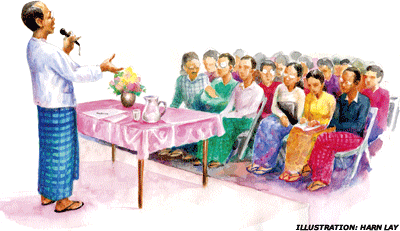
| By YENI | JANUARY, 2005 - VOLUME 13 NO.1 |
The National Literary Awards
In

“Along the tour, we, the writers, can touch and hear directly the feelings of the people,” says Nu Nu Yi, a famous female novelist and Literary Award recipient. “We do this because of our love of literature.”
The Burma Writers Union was established before World War II and was allowed to continue to operate through the Japanese occupation. In 1944 the group inaugurated a festival in honor of the literati (sarsodaw). The day is dedicated to Pon Nya, a famous 19th century poet and playwright. “Sarsodaw-nei” or “Literati Day” is celebrated during “Natdaw”, the ninth month of the Burmese lunar calendar, which falls in November-December on a western calendar.
“Literati Day was born from the era of anti-fascist struggle, so the writers have a common history of resistance,” remarked Dagon Taya, a leading post-war writer. After
Writers are held in high esteem by the Burmese as philosophers, sources of knowledge and guides to living. This admiration is perhaps culturally related to the respect paid to the wisdom of prominent Buddhist monks on the part of ordinary Burmese. The democratic period (1948-62) was a golden age for writing and publishing in
Since the 1962 coup that brought the Burmese Socialist Program Party, or BSPP, to power (it ruled until 1988),
Despite the restrictions imposed by the government, the influence of the “people’s literature movement” has continued through to the present day.
Ironically, the strict censorship regime makes the national literary tour more inviting for participants. “At the outdoor literature ceremonies we have an opportunity to talk about issues that we can’t write about,” says Nu Nu Yi. A regular attendee of literary events, student activist Zin Maung, agrees: “The writers’ speeches reflect socio-economic and political questions.”
One of the most popular speakers on the literary tour during the 1980s was satirist Ba Thaw, better known as Maung Thaw Ka. At public engagements he was known for his biting wit. General Secretary of the National League for Democracy, or NLD, Aung San Suu Kyi wrote an article celebrating him once: “On being told that a fellow writer believed in ghosts, Hsaya [teacher] Maung Thaw Ka riposted: ‘He believes in anything, he even believes in the Burmese Socialist Program Party.’”
Maung Thaw Ka was active in the 1988 mass popular uprising against the government. On September 18, 1988 the Burma Army bloodily suppressed the mostly peaceful protest, killing at least 1,000 civilians. Maung Thaw Ka was a founding central executive committee member of the NLD. In 1989 he was arrested, then in October convicted by a military tribunal of trying to foment a mutiny in the Burma Army and sentenced to 20 years’ hard labor. In 1991 he died in prison.
Another founding NLD member, the renowned poet Tin Moe, was jailed for three years. After his release, the government banned his works and prohibited him from public speaking. Tin Moe went into exile.
In military-controlled
The October 2004 purge of Prime Minister Gen Khin Nyunt and his subordinates has brought even tighter censorship. Though no official announcement was made,